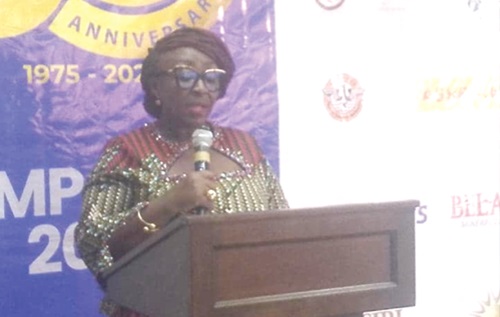The Minister of Tourism, Culture and Creative Arts, Abla Dzifa Gomashie, has called for improved services and facilities in the hospitality industry that will leave patrons with memorable and excellent services and experiences to make the country the preferred tourism destination.
She said the hospitality sector remained the backbone of Ghana's tourism sector, stressing that the tourism sector contributed GH¢4.8 billion to the economy last year and could do even more with some intentional efforts at excellence.
She further called on the Ghana Hotels Association (GHA) to help the ministry encouge industry players to aim at attracting more patronage that would impact economic gains for themselves and the country.
The minister was speaking at a symposium in Cape Coast last Thursday to mark the 50th anniversary of the Ghana Hotels Association.
The symposium, dubbed "50 years of advocacy, perseverance and impacting Ghana's tourism and hospitality industry", assembled stakeholders in the industry to promote gains and enhance efficiency.
Ms Gomashie urged the association to help the ministry and its agencies to weed out hotels with beautiful pictures on the Internet but with contrasting realities.
"You must help us to weed out hotels with beautiful pictures on the Internet, but nothing to show in reality.
Our collective image as a country must be protected," she said.
Ms Gomashie said it was important to admit that while there had been significant success in the tourism and hospitality industry, which had put Ghana on the international stage, a lot needed to be done to improve services and the experiences offered to patrons.
She said it was obvious that many hospitality facilities took patrons for granted and did not aim to give them optimal services.
The minister said efforts must be made to use the unique characteristics of the various regions and ethnicities, explore the cultures of food, dance and experience to make hospitality and tourism desirable experiences.
Ms Gomashie said the hospitality industry must patronise local goods and services to connect the arts industry to their facilities to enhance gains for the country while promoting the uniqueness of the country.
"If I am in your hotel room, what shows I am in Ghana?
There has to be something that is different,” she said.
Invest in employees
Ms Gomashie also stressed the need to invest in employees for excellent services.
![]()
A section of the participants
"Your employee should not bring me Pepsi when I ask for Coca-Cola.
She shouldn't bring me pito when I ask for asaana," she stated, and urged hospitality facility owners to invest in training the human resources at their facilities.
Commendation
Ms Gomashie acknowledged the role of the Ghana Hotels Association in developing the hospitality sector, saying it mirrored the transformation of the Ghana tourism industry from a modest domestic industry to the now vibrant international brand and its prospective future.
She indicated that the association had advocated higher standards, unity and professionalism through economic transitions, policy reforms, global recessions and even a pandemic that so much impacted the tourism sector.
She commended the association for the leadership, advocacy and innovation in improving quality and service delivery, and putting Ghana on the international map.
She emphasised that the hospitality industry remained a critical pillar to the government's Black Star Experience to position Ghana as the gateway to Africa.
The minister reiterated that the government remained committed to working with the private sector to build a competitive and resilient tourism and hospitality industry to position Ghana as the preferred destination for leisure, business and cultural tourism in West Africa and the rest of Africa.
To achieve this, she said, the national tourism policy and culture policy were being reviewed to meet international standards.
Ms Gomashie stressed the need to keep the environment clean and work together to keep, especially, water bodies, safe.
"We envision a future when every hotel in Ghana tells a story; a beautiful and unique story not just of comfort or class, but of sustainability, culture and creativity,” she said.
The President of the association, Dr Edward Ackah Nyamike, called for support for the establishment of a tourism school to train staff of the hospitality industry annually to harmonise services.
He further called for the transparent and accountable use of the Tourism Development Fund.
Dr Nyamike further advocated that every hotel should belong to an association to ensure the efficient regulation of the industry.
The Chief Executive Officer of the Ghana Tourism Authority, Maame Efua Houadjeto, pledged that the authority would work with the hotels association to make Ghana a preferred tourism destination.
Other speakers called for conscious efforts to make the industry profitable and project the industry as a business rather than entertainment.
An academic with a tourism and hospitality management background at the University of Cape Coast, Prof. Ishmael Mensah, urged facility owners to adopt dynamic pricing, use local resources, efficiently manage revenue, and control costs to ensure sustainable profitability.

